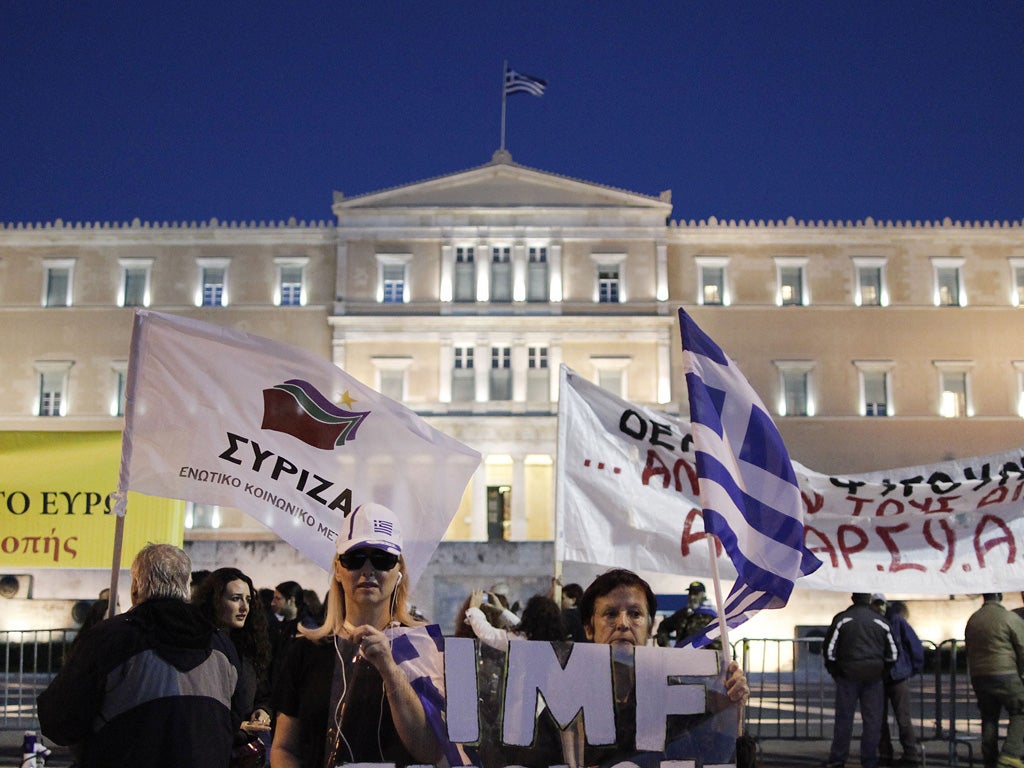Greeks protest again as leaders back further budget cuts
Tens of thousands voice anger at second set of austerity measures in a week

Your support helps us to tell the story
From reproductive rights to climate change to Big Tech, The Independent is on the ground when the story is developing. Whether it's investigating the financials of Elon Musk's pro-Trump PAC or producing our latest documentary, 'The A Word', which shines a light on the American women fighting for reproductive rights, we know how important it is to parse out the facts from the messaging.
At such a critical moment in US history, we need reporters on the ground. Your donation allows us to keep sending journalists to speak to both sides of the story.
The Independent is trusted by Americans across the entire political spectrum. And unlike many other quality news outlets, we choose not to lock Americans out of our reporting and analysis with paywalls. We believe quality journalism should be available to everyone, paid for by those who can afford it.
Your support makes all the difference.Greece endorsed a painful 2013 budget of spending cuts demanded by its international creditors, as thousands of demonstrators gathered in Athens to vent their anger at the government's handling of the financial crisis.
The budget, which includes sweeping cuts to pensions, wages and social services, is the second of two crucial steps Greece has taken in the past week in an effort to persuade the International Monetary Fund and other Eurozone countries to release the next €31.3bn tranche of bailout funds. A comfortable majority, 167 lawmakers of the 300 seat Parliament, voted for the budget late last night.
"We took a decisive step with greater unity, from now on: recovery and growth," said Premier Antonis Samaras after the vote.
However, in Syntagma Square near the city's parliament building last night, protesters chanted slogans such as "Take your bail out and leave", while others held banners that read "Plan B: yes to work, and no to the Euro" and "Down with the junta of Prime Minister Samaras". Crowds were far less than last Wednesday, when at least 80,000 protesters had gathered to oppose the country's latest package of austerity measures, worth €13.5bn, also demanded by the country's creditors. Despite much debate over whether they would accept the measures, Greek MPs narrowly passed the package, and two of the ruling parties – New Democracy and PASOK – expelled seven MPs for voting against it.
Mihalis Vergitsis, a high school teacher who attended last night's protests, said continued industrial action and protests were pivotal in influencing political developments.
"The strength of this government is already weakening: they could barely vote in favour of austerity so it will be very difficult for them to implement the measures," he said. "We must fight: pensioners and workers can't be the ones shouldering the entire burden of this crisis."
Athens has been banking on a meeting of Eurozone finance ministers today to approve the release of the next bailout tranche in order to repay €5bn worth of maturing debt on Friday, among other payments.
Without help, Mr Samaras, has warned the country would go bankrupt by the end of November.
"I'm going to Brussels armed with 167 votes," Finance minister Ioannis Stournaras said after the vote. "I expect a political statement in favour of the loan disbursement."
Meanwhile, Germany's Finance minister Wolfgang Schaeuble said the 17 countries that make up the Eurozone need more time to approve the release of the loan.
First, the "Troika" of auditors from the European Union and International Monetary Fund need to complete their report on Greece's progress and then, the Parliaments of some of the Eurozone countries will need to approve the loan.
"We are not responsible for the urgency (of the situation). All those concerned have known the deadlines for a long time," he explained in an interview with a German newspaper. "All of us in the eurozone and the IMF want to help Greece… but we will not let ourselves be put under pressure."
The country's creditors are still trying to resolve a deadlock on how they meet Greece's future financing needs.
Join our commenting forum
Join thought-provoking conversations, follow other Independent readers and see their replies
Comments